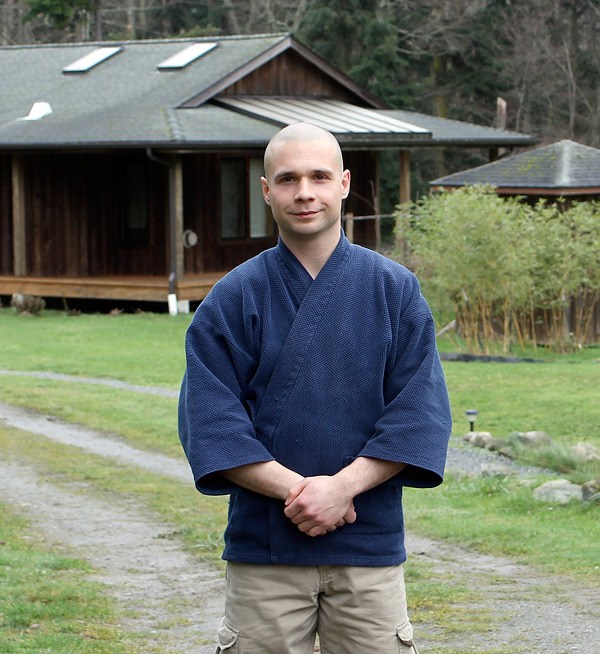Members of the Northwest Language Academy and Cultural Center are inviting South Whidbey residents to ring in the new year with reflection and rejuvenation.
The center is hosting its fourth annual Zen New Year’s Celebration, a collaboration with the Tahoma One Drop Zen Monastery in Freeland, at 5 p.m. Wednesday, Jan. 28, at the Langley academy.
Although Jan. 1 has come and passed, traditional Asian New Year’s celebrations — including the Chinese, Korean and Vietnamese New Years — coincide with the Lunar New Year, which falls on Feb. 19.
Josette Hendrix, founder and director of Northwest Language Academy, explained that the Jan. 28 date seemed to be a suitable middle ground between the Lunar New Year and Jan. 1, the Gregorian calendar’s start of a new year.
Kozan, head monk at the Tahoma One Drop Zen Monastery, explained that the New Year in Japan is the most important holiday. Although since 1873 most modern Japanese New Year celebrations have taken place on Jan. 1, citizens of various faiths and denominations continue to visit the temple and participate in traditional rituals in celebration of the holiday. Prior to the Meiji period, Japanese citizens celebrated the new year in accordance with the Lunar calendar.
As in the United States, Kozan said, the new year presents a symbolic opportunity to start anew, signifying “the rebirth of the world, and your own personal rebirth.”
In traditional Buddhist practices, he explained, every first of the new year is significant: a first bath, a first cup of tea.
On Dec. 31, Kozan said, Buddhist temples each ring 108 bells to signify the 108 human vices and to rid Japanese citizens of the 108 worldly desires. The bell-ringing is believed in the Buddhist tradition to rid individuals of the previous year’s sins. At the Northwest Language Academy ceremony, they will likely ring as many bells as there are attendees.
Zen Buddhism is a school of Mahayana Buddhism, which developed in China in the sixth century and spread to Vietnam, Korea and Japan. The Zen practice emphasizes the representation of “Buddha-nature” and insightfulness, particularly for the benefit of others. It is unique to some schools of Buddhism due to its de-emphasis on knowledge of the sutras and doctrine, focusing more upon comprehension through zazen and teacher-student interaction.
Kozan, who was raised in a family that practiced Zen, decided to join a monastery after attending a Zen Buddhist retreat while in college.
Since becoming a monk, Kozan said that his life has been “simplified.”
“I used to feel like a computer running too many programs at once,” he said. “It was backed up and slow; it was rough.”
Since his decision to study Zen as a monk, Kozan has studied in Korea and in Japan, where he met the founder of Tahoma One Drop Zen Monastery, Harada Roshi, an abbot at the Rinzai Zen training monastery in Okayama, Japan.
Tahoma One Drop Zen Monastery is open to those of all faiths and beliefs who seek solace from day-to-day life or outside pressures. Kozan and a fellow monk keep a daily schedule of meditations and lead regular retreats.
Tahoma One Drop Zen Monastery is also connected with Enso House, a home for the dying.
“This place is always there for them,” said Kozan, explaining that he hopes that the ceremony at the Northwest Language Academy may inform South Whidbey residents of the monastery’s presence and openness.
“It’s hygiene for the mind. You can live in a way that is fresh and alive,” said Kozan of the Zen practice. “It reconnects you to a sense of awe in the world. It gets you in touch with something deeper than your everyday, anxious, busy mind.”
Kozan said that the New Year ceremony will offer attendees insight, “a taste” of Zen Buddhism and Japanese culture and will afford individuals a chance to mark a new personal and worldwide beginning.
Hendrix concurred, saying that one of the reasons the cultural center hosts the New Year celebrations is that they provide an opportunity for people to “mark a new age and transition.”
“It’s the chance to pause, to notice we have an opportunity to see ourselves in a new way,” said Hendrix. “Right now one might say we are really seeking for change and evolution.”
Hendrix continued by saying that we are living in a time when the world is rife with struggle and divisiveness. The need for individuals of every “quadrant and constellation” of the world to unify in pursuit of the betterment of humanity has become distinctly evident, she contended.
It is often difficult, Hendrix continued, for a person to imagine that there is anything he or she can do to help on a global level. There are many “mono-solutions,” she said, which are very direct. These solutions may focus upon specific issues such as feeding the hungry, or sheltering the unsheltered. But the fundamental problem runs much deeper, she said. There is a need for unity based upon fundamental cross-cultural human values.
“We have to think different and bring in a level of imagining and conceptualizing…no more linear formulas,” said Hendrix. “Part of what we’re doing here is working with the ability to bring these parts that have been separated together.”
Ceremonies like the Zen New Year celebration are not about religion, said Hendrix. It is about finding and recognizing fundamental values and celebrating with community unification.
“This is about celebrating the human values we all share,” she said.
The Zen New Year’s Celebration is free and open to everyone of all cultures, faiths and ages. The ceremony requires no reservations and will be followed by a half-hour social period and open house.
For more information, visit the Northwest Language Academy and Cultural Center web site at
nwlanguageacademy.com.



